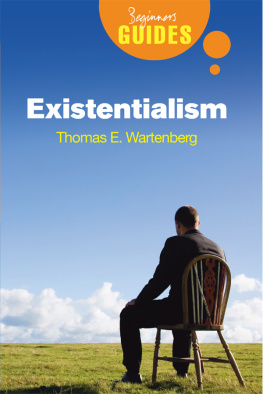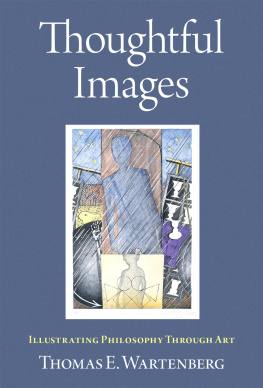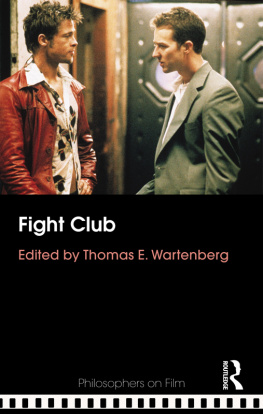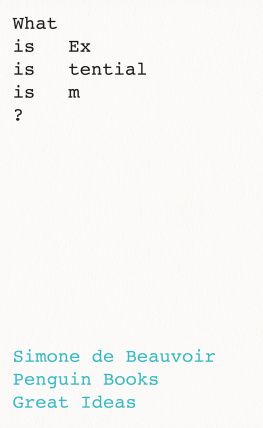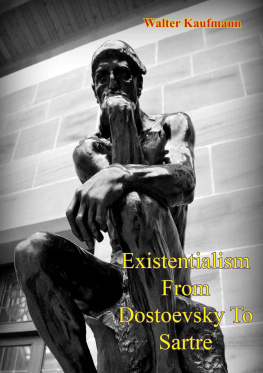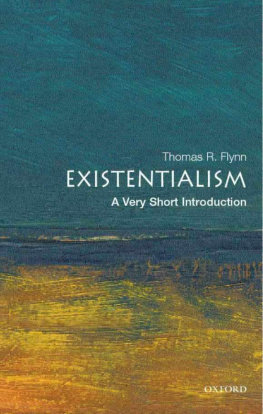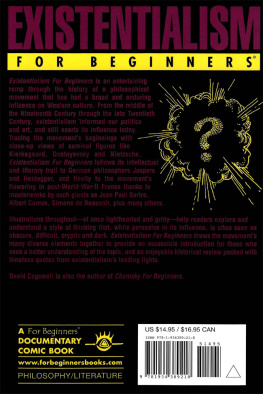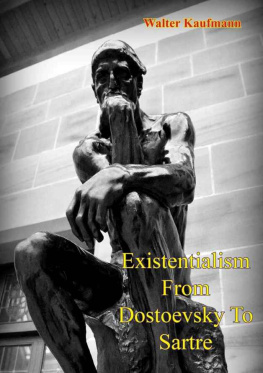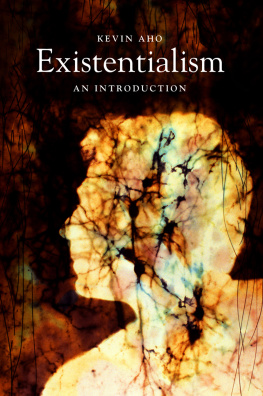Existentialism
A Beginners Guide
ONEWORLD BEGINNERS GUIDES combine an original, inventive, and engaging approach with expert analysis on subjects ranging from art and history to religion and politics, and everything in between. Innovative and affordable, books in the series are perfect for anyone curious about the way the world works and the big ideas of our time.
anarchism
ruth kinna | democracy
david beetham | NATO
jennifer medcalf |
anti-capitalism
simon tormey | energy
vaclav smil | oil
vaclav smil |
artificial intelligence
blay whitby | evolution
burton s. guttman | the palestineisraeli conflict
dan cohn-sherbok & dawoud el-alami |
the bah faith
moojan momen | evolutionary psychology
r. dunbar, l.barrett & j. lycett | paul
morna d. hooker |
the beat generation
christopher gair | existentialism
thomas e. wartenberg | philosophy of mind
edward feser |
biodiversity
john spicer | fair trade
jacqueline decarlo | postmodernism
kevin hart |
bioterror & biowarfare
malcolm dando | genetics
a. griffiths, b.guttman, d. suzuki & t. cullis | psychology
g. neil martin |
the brain
a. al-chalabi, m. r. turner & r. s. delamont | global terrorism
leonard weinberg | quantum physics
alastair i. m. rae |
christianity
keith ward | hinduism
klaus k. klostermaier | racism
alana lentin |
cloning
aaron d. levine | life in the universe
lewis dartnell | religion
martin forward |
criminal psychology
ray bull et al. | mafia & organized crime
james o. finckenauer | the small arms trade
m. schroeder, r. stohl & d. smith |
crimes against humanity
adam jones | marx
andrew collier | sufism
william c. chittick |
daoism
james miller | medieval philosophy
sharon m. kaye |
SELECTED FORTHCOMING TITLES:
astronomy | feminism | modern slavery |
british politics | globalization | philosophy of religion |
censorship | history of science | racism |
civil liberties | humanism | renaissance art |
classics | journalism | romanticism |
climate change | literary theory | shakespeare |
ethics | middle east | socialism |
Existentialism
A Beginners Guide
Thomas E. Wartenberg

A Oneworld Book
Published by Oneworld Publications 2008
Reprinted 2010
This ebook edition published by Oneworld Publications 2011
Copyright Thomas E. Wartenberg 2008
All rights reserved
Copyright under Berne Convention
A CIP record for this title is available from the British Library
ISBN 9781780740201
Typeset by Jayvee, Trivandrum, India
Cover design by Simon McFadden
Oneworld Publications
185 Banbury Road
Oxford OX2 7AR
England
Learn more about Oneworld. Join our mailing list to find out about our latest titles and special offers at:
www.oneworld-publications.com
For the Whartons
In memory of Heinz, Nellie,
and Connie and for Peter
for first supporting my existential leanings
and
In memory of Joseph Epstein,
who first rekindled the flame
Preface
My interest in philosophy must have predated my receipt of Jean-Paul Sartres Being and Nothingness one Christmas from my cousins, the Whartons. I suspect their gift was a response to my discovery of Walter Kaufmanns anthology, Existentialism from Dostoevsky to Sartre, in a bookstore during one of my weekly jaunts into Manhattan. I still have no idea why I chose to buy that particular book nor what cultural message might already have provoked an interest in its subject matter. I do know that I subsequently read a variety of essays, novels, stories, and plays as a result of making the Existentialists acquaintance through that book, and that these works had a deep effect on me. Yet, in spite of my explorations, Being and Nothingness sat on my shelf for years unread. Only when I began to teach a course on Existentialism did I actually pull Sartres masterpiece off the shelf and attempt to plumb its depths.
Despite my reluctance to read one of its most important philosophical texts, Existentialism had a big impact on me as an alienated teenager growing up in the suburbs of New York in the 1950s and 1960s. It helped me interpret my feelings of isolation and loneliness as reflective of more than my own psyche, and furthered my understanding of what seemed to me a superficial, materialist world of upper-middle-class opulence surrounding me. Novels of alienated youths and essays pointing out lifes absurdity struck a chord in my soul that continues to vibrate to this day.
My entrance into professional philosophy, however, proceeded along a very different route. A course taught by Joseph Epstein provoked my interest in questions posed in the philosophy of science, for I recognized a shared concern with Existentialism about understanding reality, despite fundamental differences in how that concern was addressed. My hope is that Joe would have found this book a valuable contribution for making the Existentialists approach to answering lifes essential questions accessible to analytical minds like his own.
As my familiarity with the world of philosophy increased, the subject of Existentialism was never one I felt compelled to address. No course that I took in aesthetics or epistemology, the history of philosophy or ethics, ever included writings by any of the Existentialists. Indeed, because American graduate schools are dominated by the Analytic tradition, there was even a somewhat snobbish sense that Existentialism was not really philosophy in our sense of the word, but more of a popular form of writing that merely imitated deep thought.
It was only when I was asked to teach a course on Existentialism that I rediscovered my original attraction to that form of philosophical thinking. The Existentialists then exerted their pull on me a second time, pushing me towards a more public conception of philosophy than that endorsed by many contemporary philosophers, one I have remained committed to ever since. One of the attractions of writing a book about Existentialism is that the philosophers who are brought together under the term articulate a view of the nature of philosophy that sees philosophy less as an academic specialty than as a broad cultural practice. This practice is oriented toward a reflection on and an assessment of the nature of the lives we live and the society in which we live them. In fact, few of the thinkers I shall be writing about held an academic position. Beginning with Friedrich Nietzsche, thinkers in the Existentialist tradition rejected the professorial life, perhaps fearing that following this profession would hinder their ability to express their views freely.
Next page
